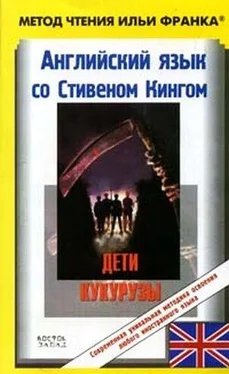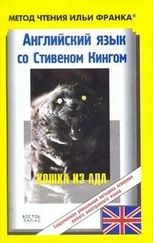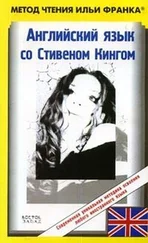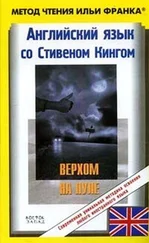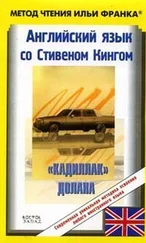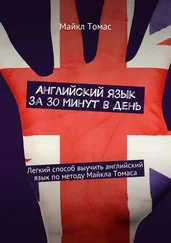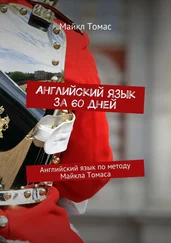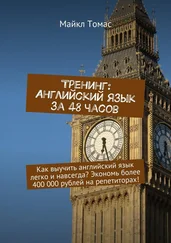hunch [hAnC], obscure [qb'skjuq], consequences ['kOnsIkwqnsIz]
Running hunched over, he hurried up the row he was in, crossed over, doubled back, and crossed over more rows. He tried to keep the voices always on his left, but as the afternoon progressed, that became harder to do. The voices had grown faint, and often the rustling sound of the corn obscured them altogether. He would run, listen, run again. The earth was hard-packed, and his stockinged feet left little or no trace.
When he stopped much later the sun was hanging over the fields to his right, red and inflamed, and when he looked at his watch he saw that it was quarter past seven. The sun had stained the corntops a reddish gold, but here the shadows were dark and deep. He cocked his head, listening. With the coming of sunset the wind had died entirely and the corn stood still, exhaling its aroma of growth into the warm air. If they were still in the corn they were either far away or just hunkered down and listening. But Burt didn't think a bunch of kids, even crazy ones, could be quiet for that long. He suspected they had done the most kidlike thing, regardless of the consequences for them; they had given up and gone home.
He turned towards the setting sun (он повернулся в сторону заходящего солнца), which had sunk between the raftered clouds on the horizon (которое утонуло меж полосатых: «похожих на потолочные балки» облаков на горизонте; rafter — стропило; балка; raftered — c /видимыми/ стропилами, балками/опотолке, крыше/ ), and began to walk (и пошел: «и начал идти»). If he cut on a diagonal through the rows (если он срежет по диагонали, через ряды), always keeping the setting sun ahead of him (всегда равняясь на заходящее солнце: «всегда держась заходящего солнца впереди него»), he would be bound to strike Route 17 sooner or later (рано или поздно он должен будет выйти на шоссе 17; to bind — связывать; обязывать, обрекать ).
The ache in his arm had settled into a dull throb that was nearly pleasant (боль в его руке поутихла до тупого подергивания, которое было почти приятно), and the good feeling was still with him (и хорошее чувство было все еще с ним). He decided that as long as he was here (он решил, что пока: «так долго, как»он находится здесь), he would let the good feeling exist in him without guilt (он позволит этому хорошему чувству существовать в нем без чувства вины). The guilt would return when he had to face the authorities (чувство вины вернется, когда ему придется встретиться с/предстать перед властями) and account for what had happened in Gatlin (и сообщить обо всем, что произошло в Гатлине; account — счет; сводка; отчет; описание, рассказ; to account for smth. — объяснять что-либо; отчитыватьсявчем-либо, зачто-либо ). But that could wait (но это может подождать).
He pressed through the corn (он пробирался через кукурузу; topress— нажимать; надавливать; протискиваться ), thinking he had never felt so keenly aware (думая о том, что он никогда еще его мысли не были такими ясными, а чувства острыми: «не чувствовал себя так остро чувствующим/воспринимающим»; aware — /о/сознающий; понимающий; чутко воспринимающий ). Fifteen minutes later the sun was only a hemisphere poking over the horizon and he stopped again (пятнадцатью минутами позже солнце было лишь полукругом, выступающим над горизонтом, и он остановился снова; hemisphere — полусфера, полушарие ), his new awareness clicking into a pattern he didn't like (его новое обостренное восприятие внезапно приобрело оттенок, который ему не понравился: «прещелкнуло в конфигурацию, которая…»; pattern— образец; шаблон; рисунок, узор; структура, форма; конфигурация, характер ). It was vaguely… well, vaguely frightening (он был смутно… ну, что ли, смутно пугающим).
diagonal [daI'xgqnl], hemisphere ['hemIsfIq], vague [veIg]
He turned towards the setting sun, which had sunk between the raftered clouds on the horizon, and began to walk. If he cut on a diagonal through the rows, always keeping the setting sun ahead of him, he would be bound to strike Route 17 sooner or later.
The ache in his arm had settled into a dull throb that was nearly pleasant, and the good feeling was still with him. He decided that as long as he was here, he would let the good feeling exist in him without guilt. The guilt would return when he had to face the authorities and account for what had happened in Gatlin. But that could wait.
He pressed through the corn, thinking he had never felt so keenly aware. Fifteen minutes later the sun was only a hemisphere poking over the horizon and he stopped again, his new awareness clicking into a pattern he didn't like. It was vaguely… well, vaguely frightening.
He cocked his head (он поднял свою голову; cock— петух; tocock— /лихо или настороженно/ поднимать или склонять набок /голову/ ). The corn was rustling (кукуруза шелестела).
Burt had been aware of that for some time (Берт осознавал это уже в течение некоторого времени), but he had just put it together with something else (но он только что сопоставил это с чем-то еще). The wind was still (ветра не было: «ветер был неподвижен»). How could that be (как же такое может быть)?
He looked around warily (он с тревогой огляделся; wary— настороженный; подозрительный ), half expecting to see the smiling boys in their Quaker coats creeping out of the corn (почти: «наполовину» ожидая увидеть улыбающихся мальчиков в своих квакерских пиджаках, выползающих из кукурузы), their knives clutched in their hands (сжимая в руках ножи: «их ножи сжаты в их руках»). Nothing of the sort (ничего подобного). There was still that rustling noise (все тот же шелестящий звук). Off to the left (в отдалении слева; off— указывает на отдаление, удаление от чего-либо ).
He began to walk in that direction (он пошел в ту сторону), not having to bull through the corn any more (больше ему не приходилось ломиться через кукурузу; bull— бык; tobull— двигаться напролом ). The row was taking him in the direction he wanted to go, naturally (ряд сам: «естественно» вел его в направлении, в котором он хотел идти). The row ended up ahead (впереди ряд заканчивался). Ended (заканчивался)? No, emptied out into some sort of clearing (нет, был опустошен, образуя прогалину; empty— пустой; to empty /out/ — опустошать; пустеть;to clear— чистить, расчищать ). The rustling was there (шелест исходил оттуда: «был там»).
Читать дальше
